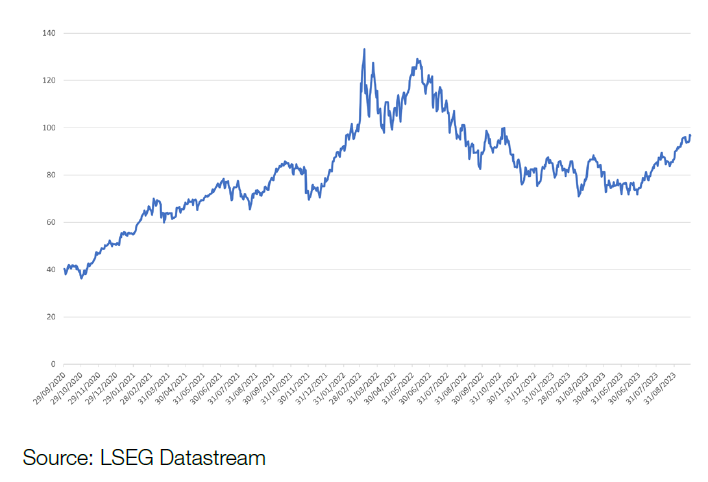Higher oil prices weigh on financial markets
Stocks and bonds fell last week as higher oil prices added to concerns about interest rates staying higher for longer.
In the US, the S&P 500 fell 1.1%, its fourth-consecutive week of declines, while the Dow and Nasdaq slid 1.5% and 0.4%, respectively. Concerns about a US government shutdown also weighed on investor sentiment.
In Europe, the Stoxx 600 and Germany’s Dax both slipped 0.1% after central bank officials indicated that monetary policy would need to stay restrictive for some time. The FTSE 100 fell 0.2% despite better-thanexpected UK economic growth in the first quarter.
Rising oil prices and US interest rate woes also weighed on stocks in Japan, where the Nikkei ended the week down 2.5%. The yen hit an 11-month low against the dollar, adding to speculation that Japanese authorities could intervene to prop up the yen. China’s Shanghai Composite fell 0.2% ahead of a ten-day holiday for Mid- Autumn Festival and China’s National Day.
Last week’s market update*
• FTSE 100: -0.21%
• S&P 500: -1.14%
• Dow: -1.47%
• Nasdaq: -0.39%
• Dax: -0.12%
• Hang Seng: +0.45%
• Shanghai Composite1: -0.16%
• Nikkei 225: -2.51%
• Stoxx 600: -0.05%
• MSCI EM ex Asia: -0.21%
*Data from close of business Friday 22 September to close of business
Friday 29 September
1Closed on Friday 29 September
UK manufacturing data disappoints
The FTSE 100 slumped 1.3% on Monday (2 October) following the release of disappointing UK manufacturing data. The S&P Global/CIPS manufacturing purchasing managers’ index (PMI) showed a marginal increase from 43.0 in August to 44.3 in September, which is still well below the 50.0 mark that separates growth from contraction. The headline manufacturing PMI for the eurozone also painted a gloomy picture, declining from 43.5 to 43.4. This weighed on the Stoxx 600, which fell 1.0%.
US stocks were largely flat on Monday despite a lastminute deal to avert a government shutdown. The Institute for Supply Management’s manufacturing PMI for the US rose from 47.6 in August to 49.0 in September, the highest reading since November 2022. The encouraging data added to concerns about US interest rates staying higher for longer and resulted in last week’s global bond rout resuming on Monday. The yield on the benchmark ten-year US Treasury note rose to 4.7%, the highest level since 2007.
Oil prices near $100 per barrel
Last week saw the price of Brent crude oil top $96 per barrel. The latest data showed a decline in oil inventories and critically low stockpiles at the Cushing hub in the US. Oil prices have gained 30% in the third quarter alone.
Brent crude oil ($ per barrel)
The latest rally has been driven by extended production cuts caused by Saudi Arabia keeping supply tight. The Energy Information Administration’s estimate for oil demand for this year has also been revised up.
Fed’s preferred inflation measure eases
Higher oil prices are adding to investors’ fears about persistent inflation in the US and Europe, although these concerns abated somewhat following the release of encouraging US inflation data on Friday. The core personal consumption expenditures (PCE) price index – the Federal Reserve’s preferred measure of inflation – rose by just 0.1% in August. This was lower than the 0.2% gain forecast by economists and the smallest monthly increase since November 2020. On an annual basis, core PCE measured 3.9%, the first sub-4% reading in around two years.
Less positively, the Conference Board’s gauge of consumer confidence fell again in September to 103.0 from 108.7 in August. This was driven by a steep decline in the ‘expectations’ sub-index to 73.7 from 83.3. The Conference Board said that a reading below 80.0 historically signals a recession within the next year.
Eurozone inflation at lowest level in two years
In the eurozone, consumer prices rose by 4.3% year-onyear in September, which was below forecasts and the slowest pace in two years, according to Eurostat’s flash reading. Core inflation (excluding food, energy, alcohol and tobacco) fell to 4.5% year-on-year from 5.3% yearon- year the previous month.
The data was published a few days after a speech by European Central Bank (ECB) president Christine Lagarde, in which she said that while borrowing costs may have reached their peak, they will remain high for as long as it takes to get inflation down to the 2% target. Her comments were echoed by ECB chief economist Philip Lane, who said interest rates would be “set at sufficiently restrictive levels for as long as necessary”.
UK economic growth better than expected
Here in the UK, figures from the Office for National Statistics (ONS) showed gross domestic product (GDP) grew more strongly than expected in the first quarter of the year. GDP expanded by 0.3% in the first quarter, up from the ONS’s previous estimate of 0.1%. Secondquarter GDP is estimated to have grown by 0.2%, in line with the ONS’s previous estimate. The data also showed that by the end of the second quarter, the UK economy was 1.8% larger than in the final quarter of 2019 (the last full quarter before the pandemic struck). This puts its growth ahead of Germany (0.2%) and France (1.7%) over the same period, but below Italy (2.1%), Canada (3.5%), Japan (3.0%) and the US (6.1%).
Meanwhile, data from the Bank of England showed the UK property market continued to slow in August. Net mortgage approvals for house purchases fell to 45,400, the lowest level in six months. Net approvals for remortgaging dropped to 25,000, the lowest since July 2012.




